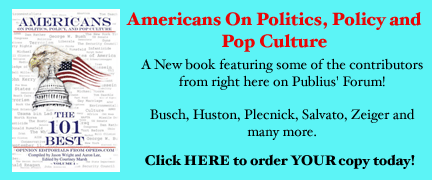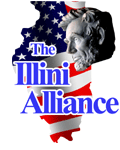

03/19/04
Recently John Kerry has been touting his staunch resistance to that greatest of evils, "special interest" money. He has practically broken his own arm patting himself on the back in congratulations though it has been pointed out repeatedly that he is one of the biggest recipients in the entire Senate of "special interest" money by way of lobbyists and other benefactors.
These days the accusation of taking "special interest money" has become a favorite mill stone to hang around any politician's neck though it is a curious thing since this country was specifically set up to recognize special Interests.
This may come as a shock to many Americans because the words "special interests" have been used as an epithet ever since FDR and his merry band of quasi-socialists decided to rewrite the Constitution with their onerous New Deal policies and Roosevelt's multitudinous, Congress avoiding Executive Orders. Special Interests have since been code words for those evil corporations as defined by FDR and his cronies and today the Democratic Party still uses those words in the same context. Today, the word is interchangeable with the dreaded "lobbyist."
Naturally, they try and pretend that "special interests" do not describe groups such as the ACLU, the various Unions or NGOs such as People for the American Way. No, these groups do not count as "special interest" groups as they are only in existence to "help" YOU, the American People. Of course, when it comes down to brass tacks, such groups are indistinguishable from any common Industrial lobbying concern with the millions of dollars they have to spread around to willing conspirators in government. As they are wont to be, Democrats are being disingenuous with their definitions.
But are special interest groups anti-American in the first place? The answer is a resounding no. All of this was foreseen and explained to a nascent country when the Constitution was proposed. James Madison, Father of the Constitution, explained fully in Federalist number 10 that special interest (or in his rhetoric, "faction") is a natural outcropping of a Republican government. In fact, he reminds us that competing interests cannot be quashed without abolishing liberty itself.
This was no soft peddling of what special interests are. As Madison described them, "By a faction, I understand a number of citizens, whether amounting to a majority or a minority of the whole, who are united and actuated by some common impulse or passion, or of interest, adversed to the rights of other citizens, or to the permanent and aggregate interests of the community." Clearly Madison understood special interests and lobbying.
He found it entirely natural, though, that special interest groups would gather to create associations among the people. He wrote that, "A landed interest, a manufacturing interest, a mercantile interest, a moneyed interest, with many lesser interests, grow up of necessity in civilized nations, and divide them into different classes." He continued that it was the "principle task of modern legislation" to recognize and take into account such interests in the "ordinary operations of government."
Madison also understood that sometimes such interests and factions would clash with the public good. He reasoned, "It is vain to say that enlightened statesmen will be able to adjust these clashing interests, and render them all subservient to the public good." Madison went on to warn that, "...causes of faction cannot be removed, and that relief is only to be sought in the means of controlling its effects." So, to imagine that such interests can be done away with is foolish thinking and the best government is one that understands the nature of special interest, will count on it always being a factor and will look for ways to work with it, as opposed to against it.
"Special interests" are not a modern boogieman. Factions have been around since men congregated to form communities since the dawn of time. In eras past such special interests congregated to stifle trade and free movement of Labor. But the founders were fully aware of special interests and were prescient enough to count upon them as a means by which the Congress could understand what the People wanted. It formed a bicameral legislature presided over by a strong chief executive all watched over by an autonomous judiciary to keep the various factions in check. The founders never attempted to eliminate special or competing interests but, rather, sought to put such interests to good use.
Madison celebrated this achievement at the end of Federalist number 10. "The influence of factious leaders may kindle a flame within their particular States, but will be unable to spread a general conflagration through the other States." He was proven right when the southern Fire Eaters of the Civil War failed to even fully convince the whole of the southern people that war against the north was needed. Even as that war began southerners were not as united against the North as popular conception assumes. Though he was wrong as to how far such a conflagration might go in that case he has been proven right in all other cases of this nature.
Madison went on, "A religious sect may degenerate into a political faction in a part of the Confederacy; but the variety of sects dispersed over the entire face of it must secure the national councils against any danger from that source." Again he was proven right when the "Religious Right," so greatly feared by the liberals of the 1990's, proved that they could not alone influence the election of Bill Clinton and throw him from office.
He finished with, "A rage for paper money, for an abolition of debts, for an equal division of property, or for any other improper or wicked project, will be less apt to pervade the whole body of the union than a particular member of it; in the same proportion as such a malady is more likely to taint a particular county or district, than an entire state." And again he is proven right when one compares such things as the conspicuous indulgence in social programs in some cities and the more cautious use of them in others of the same State, for instance.
As you can see, the Founders knew their way around a "special interest." They were aware of the dangers inherent in them but they did not overly fear them. In fact, they planned on their existence and created a system that could take advantage of them as well as guard against the more pernicious aspects of the same. From their judicious lessons we can learn how to control our own special interests today and accept them as truly an American idea.
And now that we have identified how the founders understood that special interests would be in existence throughout the Union we have to identify what they are. They are the industries we work for. They are the advocacy groups we support. They are the religions in which we believe.
In short "special interests" are you and I, the American people. We are all involved in some kind of special interest. So, if we are against special interests we are against our own best interests as individuals.
What we need today is less polemics, less misleading rhetoric and more education about just what makes this country run.

|













